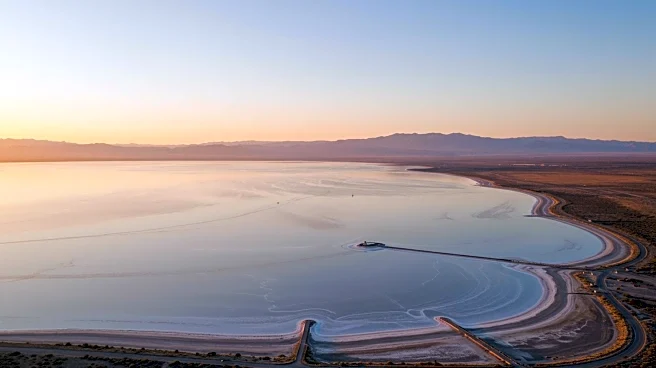What's Happening?
A recent study conducted by a University of Utah geoscientist has revealed significant human-induced changes to the Great Salt Lake's biogeochemical state over the past 200 years. Using isotope analysis of sediments from the lake's bed, the research highlights two major human-driven shifts. The first occurred in the mid-19th century with the arrival of Mormon settlers in 1847, who introduced irrigation practices that altered the lake's carbon cycle. The second shift took place in the mid-20th century when the construction of a railroad causeway in 1959 disrupted water flow between the lake's north and south arms, affecting the salinity and water balance. These changes have pushed the lake into a state not seen for at least 2,000 years, according to the study published in Geophysical Research Letters.
Why It's Important?
The findings underscore the profound impact of human activities on natural ecosystems, particularly in sensitive environments like terminal saline lakes. The Great Salt Lake supports fragile ecosystems that are vital for biodiversity and environmental health. Understanding these changes is crucial for developing effective management strategies to preserve the lake's ecological balance. The study provides valuable insights into the historical context of the lake's changes, which can inform future conservation efforts. Stakeholders, including environmental agencies and policymakers, may use this information to address the challenges posed by climate change and human intervention.
What's Next?
The study's insights could lead to increased efforts to manage and mitigate the impacts of human activities on the Great Salt Lake. Environmental groups and policymakers may push for regulations to protect the lake's ecosystem and address the ongoing drought conditions affecting its water levels. Further research may be conducted to explore additional factors influencing the lake's biogeochemical state and to develop comprehensive conservation strategies.
Beyond the Headlines
The study highlights the ethical considerations of human intervention in natural ecosystems. It raises questions about the long-term sustainability of such actions and the responsibility of current generations to preserve natural resources for future generations. The research also contributes to the broader discourse on climate change and environmental conservation, emphasizing the need for a balanced approach to development and ecological preservation.









